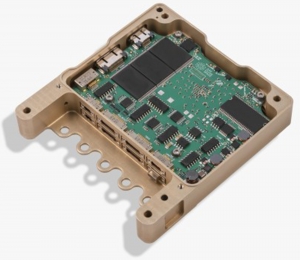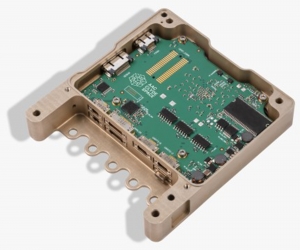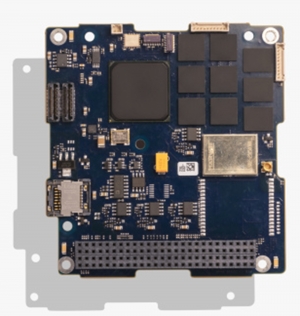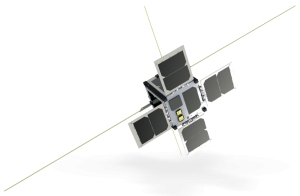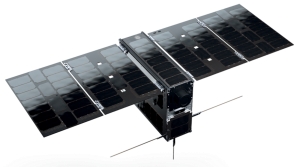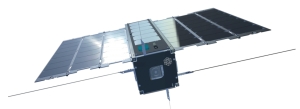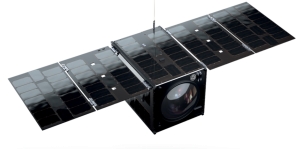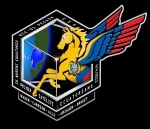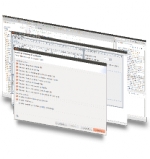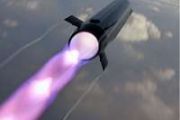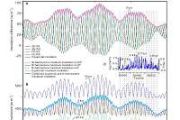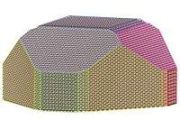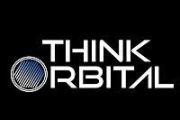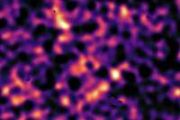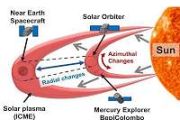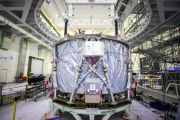Displaying items by tag: CubeSat
SIRIUS TCM LEON3FT - Command & Data Handling
Flight proven across multiple mission applications for a range of customer requirements, this readily available solution has a reputation for reliability and performance for advanced small and nano-satellite missions. The Sirius TCM LEON3FT has inherited advanced error detection and correction in it’s design. The real-time operating system runs on a LEON3FT fault-tolerant soft processor, compliant to IEEE 1754 SPARC v8, and fault tolerance is secured by using triple-modular redundancy on FPGA and memory scrubbing.
Sirius spacecraft avionics are modular in design. Modules can be combined to offer redundant configurations or to simply accommodate mission specific requirements. The Sirius TCM LEON3FT has a standard single string system that consists of an on-board computer (Sirius OBC) and a combined mass memory with CCSDS stack (Sirius TCM). The OBC runs mission specific software and manage the spacecraft system. The TCM receives and stores payload data and platform housekeeping data, while at the same time distributing telecommands and serving mass memory data to the transceiver.
SIRIUS OBC LEON3FT - Command & Data Handling
Designed for advanced nano-satellite constellations in LEO and deep space exploration missions the readily available Sirius OBC with LEON3FT delivers ‘alwayson reliable operations that work every time on time with precision performance. With enhanced error detection and correction, the Sirius OBC is tolerant to Single-Event-Effects (SEE) in logic and data storage. Fault tolerance is secured through TMR (Triple-Modular Redundancy) on all FPGA flip-flops and through boot flash and EDAC (error detection and correction) on memories.
Sirius spacecraft avionics are modular in design, modules can be combined to offer redundant configurations or to simply accommodate mission specific requirements. The Sirius TCM LEON3FT has a standard single string system that consists of an on-board computer (Sirius OBC) and a combined mass memory with CCSDS stack (Sirius TCM). The OBC runs mission specific software and manage the spacecraft system. The TCM receives and stores payload data and platform housekeeping data while at the same time distributing telecommands and serving mass memory data to the transceiver.
KRYTEN-M3 - Command & Data Handling
Developed to deliver ‘always-on’ operation, KRYTEN-M3 computing solutions work every time on time. Flight proven across multiple mission applications for a range of customer requirements, this readily available solution has advanced error detection and correction. Featuring a SmartFusion 2 SoC including Cortex-M3 processor @ 50 MHz delivering 62.5 DMIPS, and enhanced hardware/ firmware recovery mechanisms, the KRYTEN- M3 delivers advanced precision performance for the most demanding nanosatellite missions.
Our reliable space data handling solution is safeguarded with autonomous single event latch-up protections, ADVANCED PRECISION PERFORMANCE delivering high performance computing with integrated cache and Non-Volatile MRAM Memory. All protected by SECDED and EDAC mechanism to guard against radiation effects.
The inclusion of 4 GB of SLC flash memory provides ample space for mission data storage. GPS is available on Kryten-M3- PLUS models.
KRYTEN-M3 is supplied with a BSP including bare metal drivers, comprehensive API reference documentation, a full user manual and thoroughly documented source code.
EPIC SPACECRAFT - 1U
Our experience in the delivery of CubeSat missions for a wide range of applications means that our EPIC platforms have the versatility to meet the requirements of the vast majority of payloads.
The EPIC 1U CubeSat range proves that even the smallest satellites can deliver impressive performance. For most satellite payloads, trying to squeeze into a 1U is like trying to fit an elephant in the Apollo lunar module, but for many applications the limited volume is ideal. Selecting the EPIC 1U range for your mission means that you benefit from our flight proven avionics and enjoy the cost savings of a 1U launch. Small in size but massive in value, the AAC Clyde Space EPIC 1U offers the same quality design and build, flight proven performance, unrivalled operational up-time and excellent customer service as all our spacecraft products.
| Payload Volume (min) | 0.3U |
| Peak Payload Power | 15 W |
| Power Bus | VBAT 3.3V, 5V and 12V |
| Energy Storage (min) | 10Whr |
| Pointing (min) | <5º |
| Stability | 0.02º/s |
| Data Storage (min) | 4GB |
| Reliability | EPIC-SAFE |
| Data Bus | I2C, CAN, UART, QSPI, LVDS, RS232, RS422 |
| Data Downlink | 9.6Kbps |
| Frequency | VHF/UHF |
| Framing | CCSDS Compatible |
| Security | AES256 Encryption Authentication |
| Design Lifetime | 5yr |
EPIC SPACECRAFT - 6U
Our experience in the delivery of CubeSat missions for a wide range of applications means that our EPIC platforms have the versatility to meet the requirements of the vast majority of payloads.
The EPIC 6U range is fast becoming one of our most popular CubeSat classes. For missions requiring perfomance, longevity and that bit more space in the trunk, our EPIC 6U class is just the job. Boasting large deployable solar arrays and enhanced pointing, not to mention our flight proven avionics core, our EPIC 6U class is the ideal choice for both commercial and government missions.
| Payload Volume (min) | 4.5U |
| Peak Payload Power | 120W |
| Power Bus | VBAT 3.3V, 5V and 12V |
| Energy Storage (min) | 80 Wh |
| Pointing (min) | <0.05º |
| Stability | 0.002º/s |
| Data Storage (min) | 4 GB |
| Reliability | EPIC-SAFE |
| Data Bus | I2C, CAN, UART, QSPI, LVDS, RS232, RS422 |
| Data Downlink | 8Mbps/9.6Kbps |
| Frequency | S/VHF/UHF |
| Framing | CCSDS Compatible |
| Security | AES256 Encryption Authentication |
| Design Lifetime | 5yr |
EPIC SPACECRAFT - 3U
Our experience in the delivery of CubeSat missions for a wide range of applications means that our EPIC platforms have the versatility to meet the requirements of the vast majority of payloads.
The EPIC 3U CubeSat range is our most popular spacecraft. With many AAC Clyde Space 3U CubeSats produced and operating on orbit, this range of spacecraft arguably offers the best value to orbit of any satellites. The combination of our commitment to quality design and build, flight proven performance, unrivalled operational up-time and excellent customer service means that our EPIC 3U range is the professional's choice for CubeSat missions that need to deliver.
| EPIC 3U | |
|---|---|
| Payload Volume (min) | 2 U |
| Peak Payload Power | 60 W |
| Power Bus | VBAT 3.3V, 5V & 12V |
| Energy Storage (min) | 40 Wh |
| Pointing (min) | <0.1º |
| Stability | 0.005º/s |
| Data Storage (min) | 4 GB |
| Reliability | EPIC-SAFE |
| Data Bus | I2C, CAN, UART, QSPI, LVDS, RS232, RS422 |
| Data Downlink | 8Mbps/9.6Kbps |
| Frequency | S/VHF/UHF |
| Framing | CCSDS Compatible |
| Security | AES256 Encryption, Authentication |
| Design Lifetime | 5yr |
EPIC SPACECRAFT - 12U
Our experience in delivery of CubeSat missions for a wide range of applications means that our EPIC platforms have the versatility to meet the requirements of most payloads.
The big dog of our CubeSat range is the EPIC 12U. With up to 8U of available payload volume (or 12U of payload on our 16U option), and the ability to accomodate large arrays of deployable solar panels, this class of CubeSat offers increased performance whilst still boasting the same proven avionics core.
| Payload Volume (min) | 9U |
| Peak Payload Power | 240 W |
| Power Bus | VBAT 3.3V, 5V and 12V |
| Energy Storage (min) | 160 Wh |
| Pointing (min) | <0.05º |
| Stability | 0.002º/s |
| Data Storage (min) | 4 GB |
| Reliability | EPIC-SAFE |
| Data Bus | I2C, CAN, UART, QSPI, LVDS, RS232, RS422 |
| Data Downlink | 8Mbps/9.6Kbps |
| Frequency | S/VHF/UHF |
| Framing | CCSDS Compatible |
| Security | AES256 Encryption Authentication |
| Design Lifetime | 5yr |
NEE-01 Pegaso
NEE-01 Pegaso is an Ecuadorian technology demonstration satellite, and Ecuador's first satellite launched to space.
Built by the Ecuadorian Civilian Space Agency (EXA), it is a nanosatellite of the single-unit CubeSat class. The spacecraft's instruments include a dual visible and infrared camera which allows the spacecraft to take pictures and transmit live video from space.
The satellite operated normally until 23 May 2013 wnen there was a collison with a debris cloud. After the incident, the satellite was found to be "spinning wildly over two of its axes" and unable to communicate with its ground station. While efforts were made to reestablish control of Pegaso, on 28 August 2013 the decision was made by EXA and the Ecuadorian government to declare the satellite as lost.
Generation 1 Onboard Software
Bright Ascension’s Generation 1 Onboard Software product, or Gen1 for short, combines our mature component-based software framework with proven software components and an Eclipse-based tool system.
It provides an excellent solution for the command and data handling needs of the next generation of highly-capable CubeSats and other nano-satellites. Gen1 will enable you to rapidly and cheaply produce robust software for your spacecraft whatever subsystems you choose, and, where we already provide support for your subsystems, get a near-complete solution out-of-the-box. Bright Ascension are also able to offer bespoke solutions based on this software, letting you focus on the aspects of the mission that are most important to you.
Key Benefits
Rapidity
Rather than writing software from scratch, Generation 1 provides you with most of the functionality you need off-the-shelf. This allows you to focus on producing or procuring code to cover the unique parts of your mission. Whatever development you do, cross-platform support means most development and testing can be done on desktop PCs without access to flight hardware or engineering models. On the ground side, we include a graphical test application software which will provide telemetry monitoring and telecommand to support your development and AIT activities.
Flexibility
The component-based architecture we’ve used for Generation 1 means that software can be assembled from a library of existing, validated code and supplemented with new components to introduce new capabilities.
This flexibility extends into orbit, with a high level of reconfigurability and automation to cope with evolving mission needs and provide plenty of troubleshooting options.
Portability
Generation 1 was designed with portability in mind. An abstraction and layer and flexible build system make it straightforward to add support for new operating systems and architectures. It is also easy to develop your onboard software on one platform, such as desktop PC, and transfer your working solution to another platform, such as an onboard computer, with few, if any, changes.
Interoperability
Wherever possible we adopt recognised and mature international standards to promote interoperability and portability. Generation 1 uses CCSDS standards for communications and for I/O handling on board giving you the most options for the operation of your spacecraft and adaptation of existing software to the Generation 1 framework. Gen 1 includes an ECSS Packet Utilisation Standard (PUS) compliant protocol stack, providing a standard TM/TC solution already compatible with many existing ground segments.
Robustness
Our heavily tested, proven code is developed to MISRA-C standards for safe, reliable embedded systems. Our scheduling system facilitates the development of robust, verifiable task schedules allowing you to be sure your onboard software will meet strict real-time requirements.
Ease of Use
We recognise the importance of good documentation which is why you will find comprehensive API reference documentation, a full user manual and thoroughly documented source code.
Bright Ascension Ltd
We started Bright Ascension in 2011 to offer a fresh and innovative approach to engineering research and development in the space industry and other high technology areas. We have a unique mix of down-to-earth, hard-nosed, practical engineering experience and a rigorous approach sharpened through academic research. Our varied back-catalogue means that we are as comfortable with abstract theoretical concepts as we are with getting our hands dirty and producing effective products in difficult conditions. Knowing the theory allows us to take a step back and offer a clear perspective on your problems; being practical means that we never lose sight of the real-world constraints you are working with.
We have applied our experience and innovation to Generation 1, our industry-leading onboard software product for Nano-Satellites, including CubeSats. Rather than being a one-size-fits-all solution, or requiring significant accompanying consultancy, Generation 1 is a software toolkit, allowing you to quickly and easily assemble onboard software to meet the needs of your mission from a library of proven software components, utilising our mature software framework and development tools. We can provide an end-to-end solution with the addition of our Generation 1 Mission Control System, which complements our onboard software to provide a complete solution from early prototyping, through early integration, AIT and on-orbit operations.

